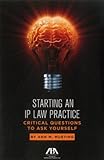Starting an IP law practice : critical questions to ask yourself / by Ann M. Mueting.
Material type: TextLanguage: English Publisher: Chicago, IL : American Bar Association, Section of Intellectual Property Law, [2012]Description: xiv, 151 pages : forms ; 23 cmContent type:
TextLanguage: English Publisher: Chicago, IL : American Bar Association, Section of Intellectual Property Law, [2012]Description: xiv, 151 pages : forms ; 23 cmContent type: - text
- unmediated
- volume
- 9781614386865
- 1614386862
- Starting an intellectual property law practice
- 346.7304/8 23
- KF 3165 M948s 2012
| Item type | Current library | Home library | Collection | Shelving location | Call number | Copy number | Status | Date due | Barcode |
|---|---|---|---|---|---|---|---|---|---|
 Libro
Libro
|
Biblioteca Juan Bosch | Biblioteca Juan Bosch | Ciencias Sociales | Ciencias Sociales (3er. Piso) | KF 3165 M948s 2012 (Browse shelf(Opens below)) | 1 | Available | 00000122590 |
Includes bibliographical references and index.
Starting your own IP law practice : what questions should you ask (yourself and others) -- Case study 1 : solo patent practitioner -- Case study 2 : two-person/two-office patent practice -- Case study 3 : small firm patent practice -- Case study 4 : small paperless patent firm -- Case study 5 : small trademark practice -- Case study 6 : IP practice in general law firm -- Case study 7 : ten-plus practitioner patent prosecution firm -- Case study 8 : in-house IP practice -- Conflicts and liability in an IP practice.
Intellectual property is one of the most rapidly growing areas of legal practice, and one that is particularly suited to small and boutique firms focused exclusively on IP cases. Many attorneys are considering going off on their own in this dynamic practice specialty. Starting an IP Law Practice provides the right questions to ask in deciding whether to go out on your own. As you evaluate your options, Ann M. Mueting explains what other practitioners have faced in setting up various types of practices focused on intellectual property in a variety of settings. Using a case study format, the book covers a range of career options, from solo and small firm practice to patent prosecution to IP practice in-house and at a general firm. These real-world accounts cover all aspects of starting a practice, from office equipment and staff to fees, getting and keeping clients, and firm management. Looking at the unique conflicts and liabilities of an IP law practice, the book includes practice-proven tips, tactics, links, advice, and tools such as interview questions and a new-practice checklist.


There are no comments on this title.